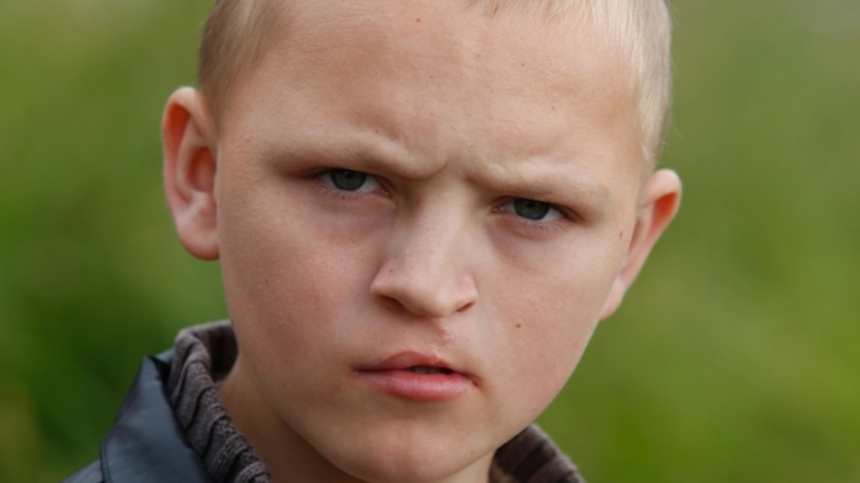Viennale 2014 Review: Bruno Dumont Reinvents Himself and The Possibilities Of TV-Series In His LI'L QUINQUIN

The series which was originally produced for French/German television station arte consists of four parts that were presented in one screening (320 minutes) at the Viennale. At the core of the story lies a classical murder mystery which will lead into a whodunit. It is just that the serious story Dumont tells is loaded with preposterous figures, slapstick scenes and a hilarious over-the-topness.
Nevertheless one can sense a spiritual and philosophical heart beating behind every shot. Therefore Li'l Quinquin is also an answer to Bruno Dumont the filmmaker, a self-parody which is ultimately also a parody on seriousness as such. But-and this is the true quality of the series-it remains deadly serious and it remains Bruno Dumont though you might laugh most of the time. Sounds strange? Well, it is.
There are two main protagonists in Li'l Quinquin. The first one is the eponymous young boy, a snotnosed beast with a heart (at least sometimes). He has a girlfriend, a miserable family living at a farm, with parents that tend to scream at him and a mentally disabled uncle (played to the discomfort of some viewers by a real-life disabled non-professional).
He strays around the hicksvilles (like before Dumont explores his hometowns in rural Boulonnais) and occasionally gets in touch with the murder mystery.
The other protagonist is one of the most extraordinary characters I have seen in a long time: It is the ascertaining Captain Van der Wayden (some call him "The Fog" because one never knows what he is up to) who together with his right hand Lt. Carpentier finds chopped bodies in dead cows and philosophizes about the meaning of good and evil while fighting against his many nervous convulsions and random fits like a sudden need to shoot.
With each episode the mystery grows bigger and new relationships between victims, culprits and neighbors are brought into the subdued light of day. Dumont explores daily live with a great feeling for the place and its people. In terms of cinematography the director keeps his high standards with his beautiful shots of banality, his wide-angle close-ups and his precise way of filming bodies and landscapes.
Dumont's casting is fascinating, the faces of his non-professional protagonists are among the most intriguing, beautiful and still disturbing one has ever seen in front of cameras. They clearly embody an expressionistic need and a questioning of the foreign and unfamiliar.
Dumont asks the question of how to deal with our fears and misunderstandings concerning the strange not only in terms of content but also in terms of form.
Van der Weyden carries most of the laughs but he also embodies perfectly what Dumont has done to his own cinema with Li'l Quinquin. Being a radical filmmaker that has always explored the barren truth behind violence, faith and sexuality by means of deformation his fiendish delight in the grotesque is not that much of a surprise.
But while in his great oeuvre he always worked with reduction and minimalistic distortions that make the viewer feel that something is not quite right, in Li'l Quinquin he embraces an orgy of deformation.
It is the same impulse but where Dumont normally would have taken something away he now adds alterations that just like the reductions transform reality into an artistic world-view. This world-view transforms the genre of TV-Crime-Series into the surrealism of looking at it seriously.
The world of Dumont is now at a point where he has to laugh about his own acrimony and the cruelty of the world around him. This might be even more ferocious. There were obvious traces of humor in The Life of Jesus, Humanité or Hors Satan but they feel to subtle and terrible to laugh. In Li'l Quinquin one has to laugh because the humour is terrible.
The distortions are clearly visible in almost every scene Van der Weyden is in. His deformations are literally looking straight at the camera. But instead of delivering a freak-show Dumont always makes clear that there is a strong empathy for and between his characters.
It might show in different ways but it exists. Yet, everybody is out of order. It is chaos...take for example an absolutely hilarious funeral scene with priests that cannot stop laughing, a pop-song performance with a masked, possible murder sitting and listening at the church while not seeming suspicious to Van der Weyden.
Or take the special way of Quinquin's grandfather to lay the table, the way Carpentier starts his car or a scene in which Van der Weyden rides a horse.
The funniest thing about Li'l Quinquin is that it isn't really funny. It is uncomfortable to laugh because there is racism, disablement and violence. Like Li'l Quinquin himself seems to play either the friendly or the diabolic role depending who he is dealing with the same is true for an audience that might be shocked while laughing even days after watching it.

Do you feel this content is inappropriate or infringes upon your rights? Click here to report it, or see our DMCA policy.






